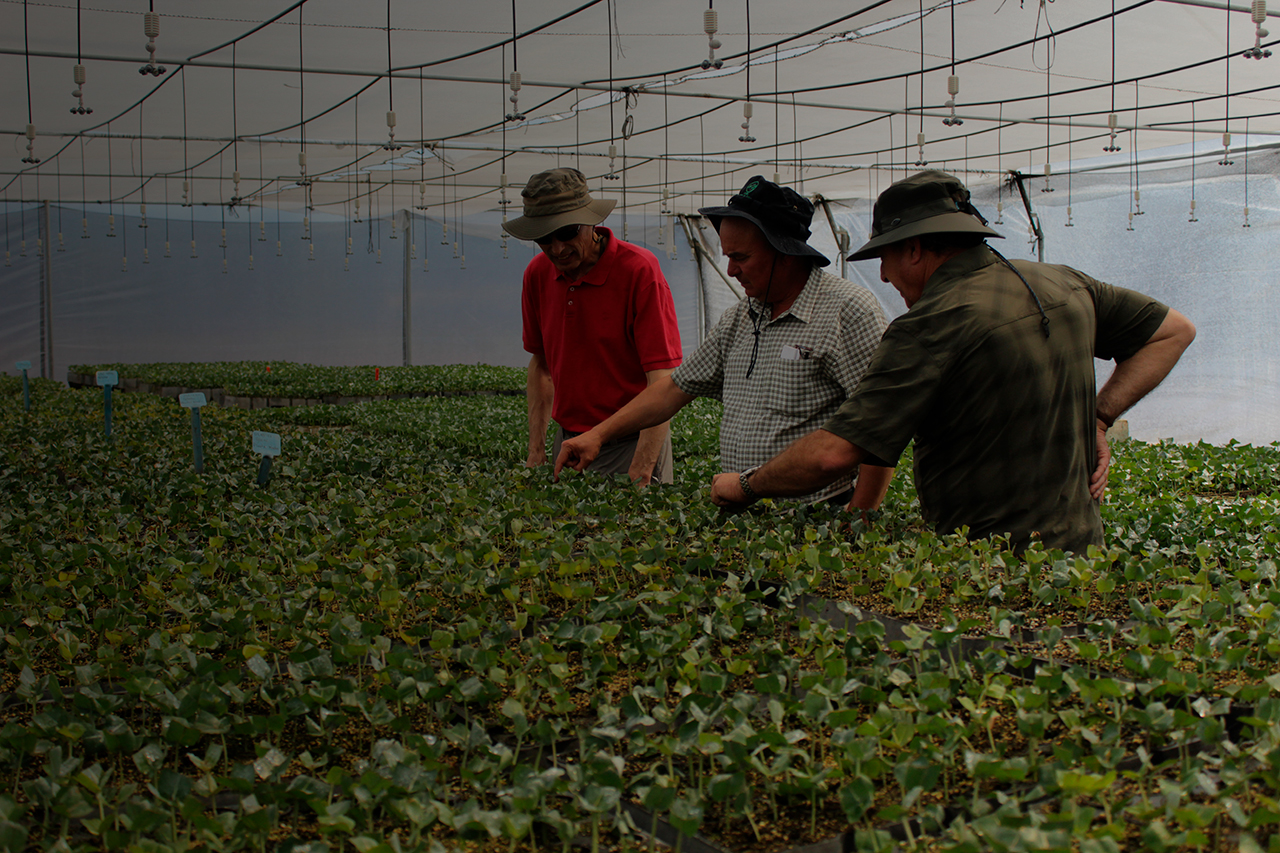Six Chilean nursery growers received the knowledge, genetic material, and technology for producing GloNi, a tree resulting from the crossbreeding of Eucalyptus globulus and Eucalyptus nitens, after 17 years of research.
Through a partnership between the Genetic Improvement Cooperative of the Faculty of Forest Sciences and Natural Resources at the Universidad Austral and the company ARAUCO, this significant breakthrough was achieved, enabling the production of wood for fiber with the best properties of both globulus and nitens species. "The hybridization of both species aims to create a specimen that combines the best traits of each," explains Dr. Fernando Droppelmann, an academic at the Universidad Austral and director of the Cooperative. "Eucalyptus globulus has excellent wood properties for fiber production but is less cold-tolerant. On the other hand, Eucalyptus nitens exhibits strong growth and high cold tolerance, though its fiber quality is lower. What we've accomplished is developing GloNi hybrids that inherit the growth and cold tolerance of E. nitens alongside the exceptional wood characteristics of E. globulus."
GloNi is a genetic material developed by ARAUCO over 17 years of research. Through a transfer program via the Genetic Improvement Cooperative, it was delivered to six selected forest nurseries capable of cultivating and developing these remarkable hybrids. A total of 60,000 GloNi plants were distributed—10,000 to each associated nursery—where they were managed to establish mother plants. The nursery members of the Genetic Improvement Cooperative benefiting from this transfer are Los Tilos, Agromen, Mahuida, Piedra del Águila, Tres Robles, and Forestal Anchile.
In the first phase of this innovative development, most of the cuttings from these mother plants were used for mass propagation. Then, in a second phase starting in September 2020, operational-scale plant production began, with these now available for commercial planting. "The end result will be improved profitability for many small and medium-sized forest owners," states Droppelmann, adding, "The name GloNi is given to individuals that demonstrate strong rooting capacity—meaning they can be vegetatively propagated—and possess the best attributes of both species, all validated through field trials."
This cooperative, part of the Faculty of Forest Sciences and Natural Resources at the Universidad Austral, was established in 1976 and has developed various genetic improvement programs in Chile, collaborating with CONAF, private companies, and the university. This project has been primarily funded by private resources.
Is there field validation for these hybrids?
Yes, hybrids are validated to ensure they exhibit the growth rate and cold tolerance of Eucalyptus nitens while maintaining the wood properties—density and pulp yield—of Eucalyptus globulus, the world's best species for cellulose production. Only hybrids that grow at the pace of nitens but with globulus wood qualities are christened GloNi. Commercialization began in 2021, with significantly larger-scale production expected annually.
In the project's first year (2019), 10,000 plants were multiplied to establish a much larger mother-plant base. During the past spring-summer season, commercial-scale production began, and this year marks the first large-scale plantings by these six nurseries. Plantations are operational from Osorno to the Seventh Region, on small and medium-sized properties, and available to any buyer through the nurseries.
What are the advantages for small or medium landowners?
If they previously planted nitens and now switch to GloNi, profitability nearly triples. Landowners benefit from improved plantations and maximized per-hectare returns. Additionally, the growth cycle is around 13–14 years.
Unfortunately, the project faced delays. The first setback occurred in October 2019, disrupting nursery investment timelines. The pandemic further complicated labor and supply chains, slowing production. However, significant planting is underway this year.
Environmentally, this species offers far greater adaptability, reducing tree mortality. The goal is to provide diverse options for landowners seeking to optimize land use.
Hybrids themselves pose no issues—quite the opposite. Chile’s international commitments on carbon capture and climate change require more forests. Faster-growing species like GloNi sequester significantly more carbon.
Moreover, replacing plastic- and steel-derived materials is urgent. Wood products offer a solution, but only if we expand sustainable forestry.
What are the projections and challenges?
Fiber demand is immense, enabling thousands of hectares in plantings—contingent on landowners. Planting decisions depend on site conditions (soil, climate) and proximity to processing plants, not mandates.
Development of Native Hybrids
Other Universidad Austral-led projects include oak (roble) and raulí hybrids, natural crosses now being enhanced to combine the best traits of both native species.
For Fernando Droppelmann, a key outcome is the first-ever human-controlled crosses, guaranteeing 50% oak and 50% raulí lineage. "This is historic," he emphasizes, noting that 70% of hybrid mini-cuttings currently mature into plants—a rate expected to exceed 80% next season.
Modernized infrastructure is another milestone, featuring high automation and environmental controls. "Now, via a mobile app, we monitor greenhouse conditions in real time—a game-changer," said Droppelmann.
"We’re fully convinced and excited—these projects offer a real native-species reforestation alternative, with superior genetics and reasonable costs," he added.
These initiatives fall under the Genetic Improvement Cooperative, comprising UACh, CONAF, nurseries, and national forestry firms, aiming to develop top-tier genetic material for scalable, commercially viable production across diverse conditions.







Comments (0)
No comments yet. Be the first to comment!
Leave a comment